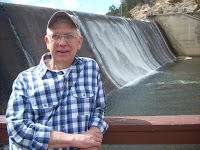Believe me. I’m wary of “You don’t want to go there,” something that always sounds like unsought advice. It doesn’t take me seriously enough. But there are situations when the warning should be taken seriously. Just what kind of adventure do you think you successfully can confront? What kind invites you? What danger stimulates your imagination?
Some years ago I read a book that intrigued me, The Brothers Bishop, by Bart Yates (Kensington Press, 2005). I was interested to read about the lives of brothers since I had four sisters and no brothers. Here’s something that got my attention, a kind of “You don’t want to go there” incident. Tommy and Nathan the brothers had a rough upbringing. Tommy was the golden child, Nathan the control freak. Some years later Tommy returns for a summer break at the family cabin. I wondered why did Tommy dove into the ocean at a dangerous spot without his brother Nathan trying to stop him. There had been an argument, a warning, and a “no.” But no fight, no restraint. I reasoned perhaps Tommy had never been restrained. Perhaps his brother would have done the same thing and so wouldn’t interfere. Perhaps he believed Tommy, like usual, would luck out. In the scene, both brothers were deeply upset. Neither was thinking sanely. But should someone have said, “You don’t want to go there”? So much of the strength of the story comes from not having everything explained. The writer asked the reader to think.
I thought about how I didn’t have a brother story of my own, but we neighborhood boys often challenged each other to do daring, sometimes stupid feats. I did many of them but, like a real young queer in training, refused to jump off the neighbor’s garage roof. Not me. These childhood experiences did help me identify with the brothers in Yate’s book.
To some people, “You don’t want to go there,” seems an invitation to fun, even if the place will cause trouble. While I don’t like the phrase, I am not one of those adventuresome people except when “there” stands for a word choice or a concept that is under scrutiny or an argument. I’m always looking for the exception in almost every discussion and sometimes wonder if this un-recommended place will provide me the perspective I am searching for. I did that sort of thing in college and graduate school papers hoping that my writing might win the day even if the concepts did not.
I am not a daredevil but I go to places in my mind that seem quite bizarre. I have memories of intense experiences that many would have wasted their breath warning me against. Life does need daring. But just because someone says, “You don’t want to go there,” doesn’t mean you have to do it or have to pass it up.
© 30 April 2018
About the Author
Phillip Hoyle lives in Denver and spends his time writing, painting, and socializing. In general he keeps busy with groups of writers and artists. Following thirty-two years in church work and fifteen in a therapeutic massage practice, he now focuses on creating beauty. He volunteers at The Center leading the SAGE program “Telling Your Story.”
He also blogs at artandmorebyphilhoyle.blogspot.com

